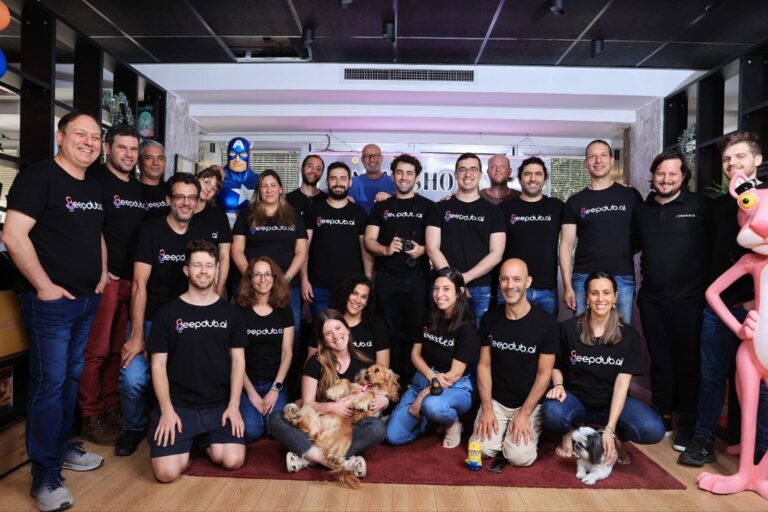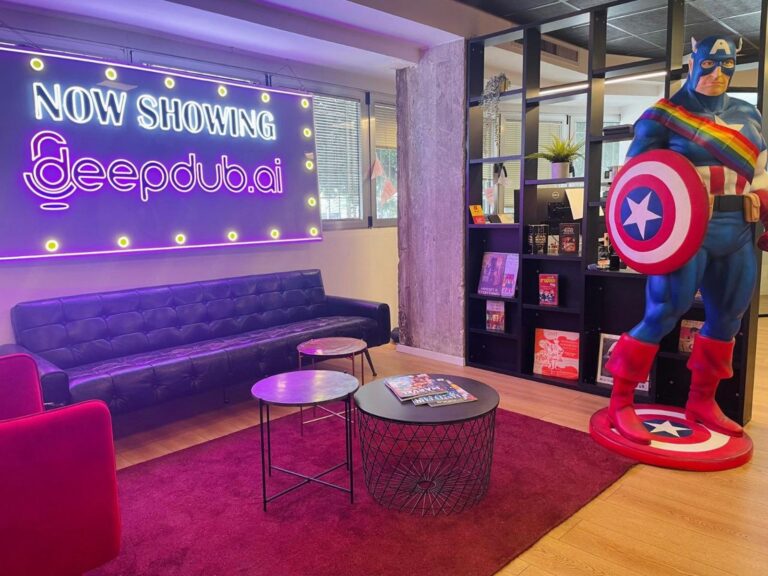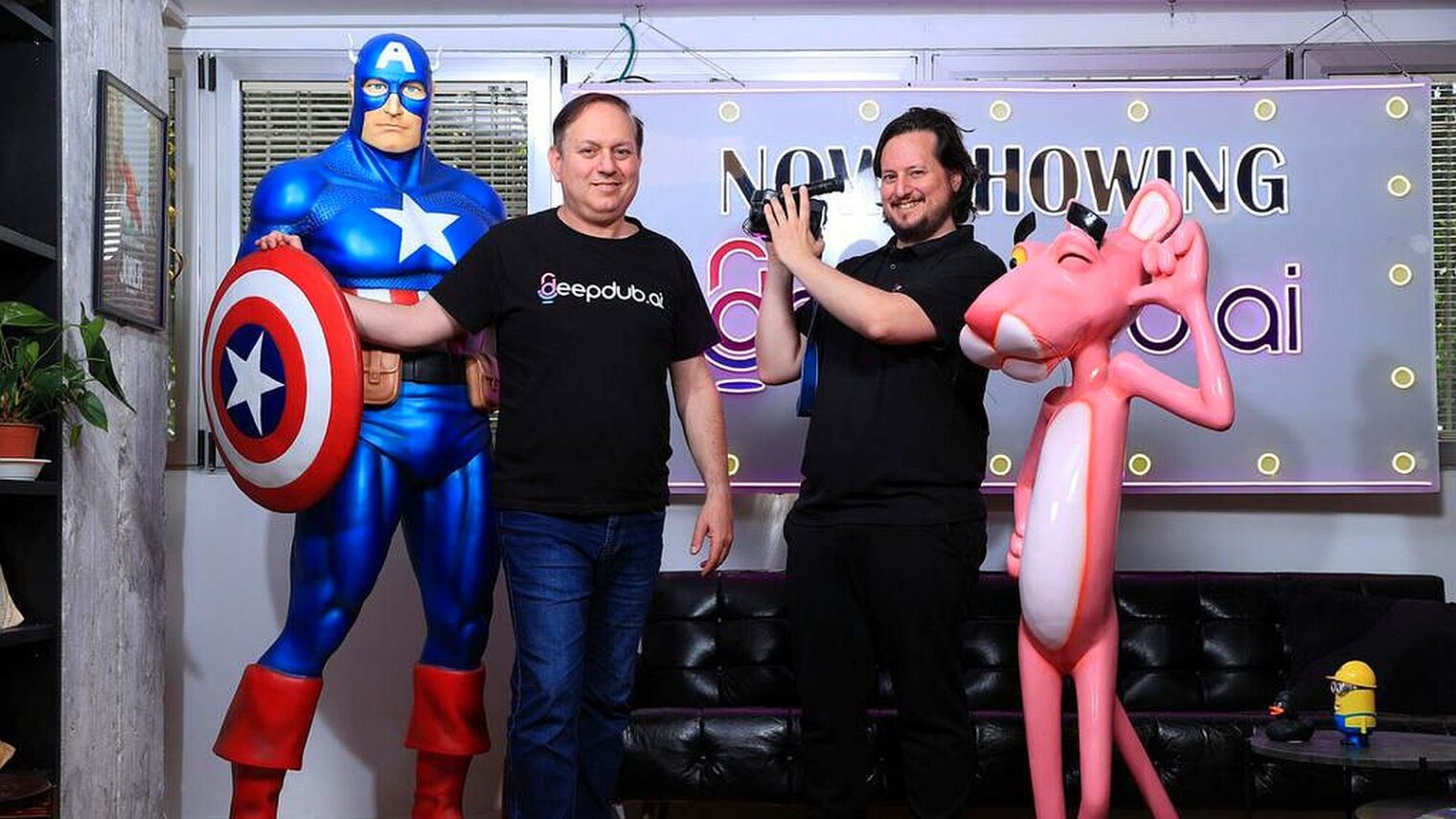Technology powered by artificial intelligence seems to be everywhere nowadays: AI-generated music that can mimic voices of the biggest stars, to the seemingly omnipotent ChatGPT, which can offer an answer to almost any question.
Now there’s Deepdub — a Tel Aviv-based startup that uses AI algorithms to automate dubbing in different languages.
Deepdub’s CEO Ofir Krakowski cofounded the company in 2019 with his brother Nir, who now serves as CTO. In the span of less than four years, the 30-strong startup has already raised over $26 million.
Aiming to bridge the language gap
Despite being relative newcomers in the corporate tech world, the brothers have decades of experience. Nir was one of the founders of the cyber unit at the Israel Security Agency (Shin Bet) nearly 20 years ago. Ofir served in the Israel Air Force’s Ofek 324 tech unit, where he founded and headed IAF’s Machine Learning and Innovation Department.
“We worked together during our service as well,” says Ofir. “We like working together very much. Each one of us brings his own strengths to the table.”
They entered the private tech sector wanting to use the vast knowledge they had accumulated to help “make the world a better place.”
Despite most of Deepdub’s customers at the moment being streaming services that carry multinational content, Ofir says the startup was established with the bigger goal of granting people access to knowledge.
“Today, knowledge-based content is not accessible to many people around the world, and the reason for that is the language barrier,” Ofir tells ISRAEL21c.

Ofir says most of the world consumes foreign content through dubbing, but companies don’t rush to dub all their material because “bringing people into the studio and recording is an expensive and convoluted process.”
Yet people feel the most comfortable consuming content in their mother tongue. “We feel safer, we can concentrate on the content itself and not the translation, which requires a lot of mental energy,” Ofir says.
Especially if it is educational content, which children digest much better in audiovisual form.
“A lot of educational video content is in English, and if no one is dubbing it, that knowledge goes nowhere. Those children that don’t have access to it are then left behind in life,” Ofir says, adding the company focuses a lot on dubbing electronic learning material.
It’s a TikTok world
“The world of the written word is in decline; this is the TikTok generation,” says Ofir. “The world is moving in a direction that’s all about video. People spend more hours watching Instagram reels, TikTok clips and YouTube shorts than on any other media platform.”

He explains that video not only conveys the information faster than print, but also utilizes more of our senses. In addition, video lends itself to multitasking.
“I can consume video or audio content while I’m cooking or driving — in this scenario, the subtitles are useless,” he points out.
As the world becomes more and more audiovisual focused, entertainment companies see dubbing as the way to connect to audiences that don’t speak their language.
Ofir says the first to understand this was Netflix. “Today, everyone understands if you want to reach global circulation, you need to localize your content.”
Never lost in translation
Deepdub’s customer list remains undisclosed since clients don’t want audiences to know the content is voiced by AI and not actual voice actors. The platform utilizes a collection of voices to produce various tones, which can dub dozens of characters in a movie or series.
The advantages for the customers include reduced expenses of dubbing production by 30 to 70 percent, depending on the genre. Using Deepdub’s technology also cuts dubbing production time by 80%, Ofir says.
Deepdub’s platform currently supports 30 languages, and that list is constantly growing. The trickiest part of the process is translation — even in the same language, there are often different dialects, slang words and intricacies.
To overcome that, the company uses an AI-powered “machine” that learns new languages and translates them.
“The machine knows how to do it in a way that sounds natural to a human ear,” says Ofir. “The content is never lost in translation; we are allowing you to consume other cultures in your own language.”
Ofir explains that the platform’s main benefit is flexibility. It allows for easy human intervention while remaining automated. For instance, the dubbing voice can be changed and adapted easily.
‘We’re not taking jobs, we’re creating them’
Despite fears that yet another industry is being taken over by AI, Ofir says the company has no intention of taking over from voice actors or translators.
“Not only are we not putting people out of a job, we’re creating more work for them,” he says.
“Those in this business who are doing well, will continue to do well. We’re focusing on aspects of the dubbing industry that have not been explored yet — languages that were considered not profitable enough, or content that was deemed not financially viable to dub.”
He emphasizes that Deepdub has existed for nearly four years, but people only began taking notice after fellow AI-powered platform ChatGPT shook the tech market at the end of 2022.
“New technology always invokes fears, but you can’t progress in life without it,” he says. “It’s like the industrial revolution — at the time, many were against it, fearing they would lose their jobs. But where would we be now without it?”
For more information, click here.

















